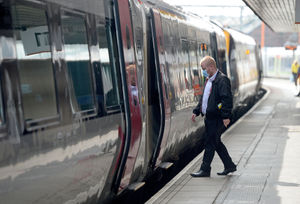Shropshire Star comment: Train fares need to move with the times
On the face of it a 1.6 per cent rise for rail passengers on the price of their season tickets does not seem unreasonable.

Indeed, it could be argued that it is not a rise at all, as it is linked to the inflation rate.
But it has to be seen in the context of our extraordinary times. Boris Johnson is encouraging people to get back into the workplace if they can, and here we have a rise in fares which will make it more expensive to do so.
The coronavirus crisis has led to a slump in demand for train travel. Higher fares do not send out a message that there is a desire to welcome back passengers.
And the way people are working has changed as a result of the pandemic. They might not be going into the office five days a week as they did in the “old days”, by which we mean before March. They may be working from home on, say, two days.
So people who used the train to go to work, and found it most cost effective to get a season ticket, may now be working much more flexibly, meaning paying for a season ticket would involve paying for journeys that they will not be making. To them this is not a fare rise keeping pace with inflation, but a big increase in costs when measured on a price-per-journey basis.
And to those who have been furloughed, having a season ticket for a service they have not been using has been a lot of money down the drain.
As Anthony Smith of the passenger watchdog Transport Focus puts it, the system should fit the way we are actually now living, rather than having “season tickets designed for city gents in the last century”.
He wants a fares system which reflects the flexibility in the way we are working. That would mean cut price deals, packages, and removing the rigidity of the season tickets.
If a season ticket straitjacket remains, travellers will not need a calculator to work out that behind this seemingly modest rise they really represent poor value.
There was that old advert which claimed it was the age of the train. But trains, and fares, have to move with the times.




